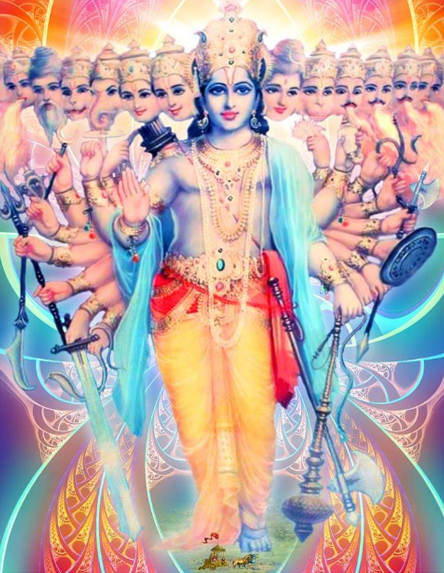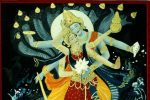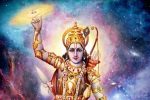NAME 80
Anuttamaḥ अनुत्तमः
One who is ‘incomparably Great’ in glory-Anuttamo. In the Sanskrit construction of the word, it means something more than what we have said; it means: ‘He is one, beyond whom there exists none who is greater than He (unexcelled). The Upanishad itself describes Him: In Gita (XI-43) we read: “For Thy equal exists not, whence another superior to Thee?” In Sri Narayana Upanishad (12) we again read, “There is nothing above or below, equal to Him”.
He is matchlessly the best; the unsurpassed. Obviously, Brahman alone can remain unsurpassed. Mahānārāyaṇa Upaniṣad (XIII.13) says, “yasmātparaṁ nāparamasti kiñcit यस्मात्परं नापरमस्ति किञ्चित् ” This means that nothing is higher than Him. The Upaniṣad continues to say that there is nothing minuter and nothing greater than Him.
Arjuna adores Kṛṣṇa (Bhagavad Gita XI.43) by saying, “You are the Lord of incomparable might, in all the three worlds, and there is none equal to you. How then, any better?”
Anuttamah– He is the Ultimate with no one Superior to Him*.
Anuttamah is somebody who has no superior or higher entity above himself, i.e., He is the highest or the Supreme entity.
Sri Adi Sankara says ‘Avidyamaanah uttamah Yasmaat sah Anuttamah – One whose Superiorsare non-existent’.
Narayana Upanishad says ‘Yasmaat param Naaparam asti kinchit – There is no other force above Him. He is Supreme’.
In the Bhagavad Gita Chapter 11, Verse 43 says:
na tvat-samo ‘sty abhyadhikah kuto ‘nyo
loka-traye ‘py apratima-prabhava
Meaning: ‘No one is equal to You in the three Worlds, how can there be anything superior to You. You are Immeasurable!’
:: भगवद्गीता – विश्वरूप संदर्शन योग ::
Bhagavad Gīta – Chapter 11
पितासि लोकस्य चराचरस्य
त्वमस्य पूज्यश्च गुरुर्गरीयान् |
न त्वत्समोऽस्त्यभ्यधिक: कुतोऽन्यो
लोकत्रयेऽप्यप्रतिमप्रभाव || 43||
pitāsi lokasya charācharasya
tvam asya pūjyaśh cha gurur garīyān
na tvat-samo ’sty abhyadhikaḥ kuto ’nyo
loka-traye ’py apratima-prabhāva
TRANSLATION
You are the father of this complete cosmic manifestation, the worshipable chief, the spiritual master. No one is equal to You, nor can anyone be one with You. Within the three worlds, You are immeasurable.
PURPORT
The Lord Krsna is worshipable as a father is worshipable for his son. He is the spiritual master because He originally gave the Vedic instructions to Brahma, and presently He is also instructing Bhagavad-gita to Arjuna; therefore He is the original spiritual master, and any bona fide spiritual master at the present moment must be a descendant in the line of disciplic succession stemming from Krsna. Without being a representative of Krsna, one cannot become a teacher or spiritual master of transcendental subject matter.
The Lord is being paid obeisances in all respects. He is of immeasurable greatness. No one can be greater than the Supreme Personality of Godhead, Krsna, because no one is equal to or higher than Krsna within any manifestation, spiritual or material. Everyone is below Him. No one can excel Him.
The Supreme Lord Krsna has senses and a body like the ordinary man, but for Him there is no difference between His senses, body, mind and Himself. Foolish persons who do not know Him perfectly say that Krsna is different from His soul, mind, heart and everything else. Krsna is absolute; therefore His activities and potencies are supreme. It is also stated that He does not have senses like ours. He can perform all sensual activities; therefore His senses are neither imperfect nor limited. No one can be greater than Him, no one can be equal to Him, and everyone is lower than Him.
Whoever knows His transcendental body, activities and perfection, after quitting his body, returns to Him and doesn’t come back again to this miserable world. Therefore one should know that Krsna’s activities are different from others. The best policy is to follow the principles of Krsna; that will make one perfect. It is also stated that there is no one who is master of Krsna; everyone is His servant. Only Krsna is God, and everyone is servant. Everyone is complying with His order. There is no one who can deny His order. Everyone is acting according to His direction, being under His superintendence. As stated in the Brahma-samhita, He is the cause of all causes.
One who is ‘incomparably Great’ in glory-Anuttamo. In the Sanskrit construction of the word, it means something more than what we have said; it means: ‘He is one, beyond whom there exists none who is greater than He (unexcelled). The Upanishad itself describes Him: In Gita (XI-43) we read: “For Thy equal exists not, whence another superior to Thee?” In Sri Narayana Upanishad (12) we again read, “There is nothing above or below, equal to Him”.
८०. ॐ अनुत्तमाय नमः |
80. OM Anuttamāya Namaḥ
Anuttamah -One who is ‘incomparably Great’ in glory-Anuttamah. In the Sanskrit construction of the word, it means something more than what we have said; it means: ‘He is one, beyond whom there exists none who is greater than He (unexcelled). The Upanishad itself describes Him: In Geeta (XI-43) we read: “For Thy equal exists not, whence another superior to Thee?” In Sri Narayana Upanishad (12) we again read, “There is nothing above or below, equal to Him”.
Avidyamānaḥ uttamaḥ yasmāt saḥ / अविद्यमानः उत्तमः यस्मात् सः He who has no superior to Him is Anuttama.
Bhagavad Gīta – Chapter 11
Pitā’si lokasya carācarasya tvamasya pūjyaśca gururgarīyān,
Na tvatsamo’styabhyadhikaḥ kuto’nyo lokatraye’pyapratimaprabhāva. (43)
INTERPRETATION GUIDED BY SANT VANI (WORDS OF SAINTS)
Anuttamaḥ
He who is unsurpassed, incomparable.
There is none greater than him. (Śaṅkara & Parāsara Battar). He is the one beyond whom there is none who exists or is greater than him. He, who is the source of Supreme Contentment (and therefore happiness).
The one who has none superior to Him.
He has none uttama, superior to Him and hence He is Anuttama. He is the most exalted. He is unparalled. The Mahānārayaṇopaniṣad says, ‘yasmāt param na aparam asti kiñcit – there is nothing superior or inferior to Him’(12).
As individuals, we swing between feelings of inferiority and feelings of superiority many
Moments of the day. An old Indian TV commercial advertising for a washing powder captures it well. The lady who sees another one in the market wearing bright, white clothes, says in Hindi, “ bhalaa uski safedi meri safedi se badkar kaise (How come the whiteness (of her sari) is better than mine?). It was a popular commercial as people could identify with this usual tendency of comparion and the ensuing jealousy among individuals.
We assure ourselves that we are better than others because we feel inferior to others in terms of looks, possessions, quality of our relationships. Also as passive consumers of media messages, we tend to feel inferior and then nothing seems to be right with who we are, what we are and what we have.
If we feel inferior, we are not comfortable with it. We struggle against it and we do it in many ways, by excelling in what we do (which is good for developing competence) and also by putting other people down.
What some haven’t figured out, is this swinging between feeling inferior or superior is the universal human struggle to feel significant. Whatever we do, whatever we have is not enough to take care of the conclusion that ‘ I am insignificant or not good enough.” All attempts to take care of this sense of insignificance, work for some time, in a limited way but don’t sustain. We carry forward this orientation to even the learning of Vedanta, and say, ‘my understanding is better than the other people’ and lull ourselves into a false sense of contentment.
The sense of insignificance comes from our conclusions in different areas : at an emotional level, the conclusion is ‘I am inadequate and incomplete as I am (apurnah)’, at an intellectual level, the conclusion is ‘I don’t know enough’ (ajnah), Our physical difficulties comes from the conclusion that I am this body which is matter and subject to death (martyah). So, what is the way out? I need to recognise that my difficulties at all these levels come from my conclusions that are not based on the absolute reality. These conclusions are based on the main conclusion, that I don’t know who I am, . Since I don’t know who I am, I have taken what I am associated with, to be me. The only lasting solution is self knowledge, discovering my own truth, my reality to be the fulfillment, that I seek.
PLEASE READ
https://os.me/do-you-compare-with-others-an-insight-on-how-to-be-yourself/
“When you choose to compare yourself to others, when you determine your own value in contrast to them, when you rank yourself based on someone else’s criteria, you do not add life to your years. In fact, it is more like taking the life out of living; only years remain. Pointless.
Be yourself. Discover yourself.”
-Om Swami
We admire and look upto people who are self assured and who are not affected by these feelings of comparison. Then, when we see that there is nothing else other than the manifestation of the Lord, can anything be superior to it? Can anything be inferior to it? Things start to shift for us.
In the Gītā, Arjuna tells Bhagavān, ‘there is none sama, equal to you. Where is the question of having somebody being superior to you?’ (11.43)
In the Bhagavad-gītā (Chapter-11; Verse-43), Arjuna who has now realized who his friend really is and that he who is standing in front of him sometimes as his friend, sometimes as the charioteer of his life, sometimes as the Virāta-Puruṣa, and sometimes as the cowherd is actually the Kṣetrajña (knower of the field) of his kṣétra (field of transformation/body), the one indwelling spirit in all animate and inanimate beings, and then he says:
पितासि लोकस्य चराचरस्य
त्वमस्य पूज्यश्च गुरुर्गरीयान् |
न त्वत्समोऽस्त्यभ्यधिक: कुतोऽन्यो
लोकत्रयेऽप्यप्रतिमप्रभाव || 11-43||
pitāsi lokasya charācharasya
tvam asya pūjyaśh cha gurur garīyān
na tvat-samo ’sty abhyadhikaḥ kuto ’nyo
loka-traye ’py apratima-prabhāva
You are the father of the entire universe, of all moving and non-moving beings, animate and inanimate. There is none more deserving than you of worship and devotion. You are the Supreme Guru and master of all. There is none equal to you in all the entire Universe, then who can possibly be greater than you, O possessor of incomparable power?
In the Pātañjali-yoga-sūtra, Anuttamaḥ is tied to a state of being (verse-42):
संतोषातनुत्तमस्सुखलाभः ॥४२॥
saṃtoṣāt-anuttamas-sukhalābhaḥ ||42||
Supreme Contentment, confers Supreme happiness.
A short but very powerful message of the way to true happiness.
In the Sanatkumāra Saṃhitā, Anuttamaḥ is related to the renunciation of all that is material, ephemeral and transient and contemplating on (and realizing) the one reality and in this, the realization of that state of supreme/peerless bliss (anuttama-sukhasyāpi):
विरज्य संसृतेर् हानौ साधनानि विचिन्तयेत्[3]
अनुत्तम-सुखस्यापि सम्प्राप्तौ भृशं दुःखितः
virajya saṃsṛter hānau sādhanāni vicintayet
anuttama-sukhasyāpi samprāptau bhṛśaṃ duḥkhitaḥ
What is clear is this: There is a plane of existence where it is possible to contemplate or even experience (even if fleetingly) that unsurpassed and incomparable (Anuttamaḥ) being who is the supreme master of the Universe and is also the in-dweller in all. That state is the state of supreme contentment.
Is there some indicator to us of how we know if we are at least on that path? Swami Vivekananda in his commentary on the Pātañjali-yoga-sūtras, gives a hint. This passage appears just before the verse quoted above (saṃtoṣāt-anuttamas-sukhalābhaḥ):
———-Quote
There also arises purification of the Sattva, cheerfulness of the mind, concentration, conquest of the organs, and fitness for the realisation of the Self. By this practice the Sattva material will prevail, and the mind will become concentrated and cheerful. The first sign that you are become religious is that you are becoming cheerful. When a man is gloomy that may be dyspepsia, but it is not religion. A pleasurable feeling is the nature of the Sattva. Everything is pleasurable to the Sattvika man, and when this comes, know that you are progressing in Yoga. All pain is caused by Tamas, so you must get rid of that; moroseness is one of the results of Tamas. The strong, the well-knit, the young, the healthy, the daring alone are fit to be Yogis. To the Yogi everything is bliss, every human face that he sees brings cheerfulness to him. That is the sign of a virtuous man.
——–Unquote
PLEASE READ
https://os.me/the-bowl-that-never-fills/
“The ceaseless flow of thoughts and desires in our minds, the incessant trickle of feelings in our consciousness, spilling over our very beings is at the root of human restlessness and discontent. We fulfill one desire and before we can enjoy the fruits of it, more often than not, we feel impelled to work towards another. As long as a mind isn’t trained to be still, it can’t be content.
And, contentment isn’t always a feeling. Or, a lack of it doesn’t mean one is greedy. Sometimes, in fact mostly, discontentment is merely the brain yakking away like a little child who’s talking to himself, the kind who has just learned to form phrases and sentences, these are the thoughts in our skull. What is even more fascinating is how an unchecked thought continues to build up and takes up all the space in our consciousness like a tiny bubble rising from the bottom of a pond to its surface and as it continues its journey to the top, it keeps on growing. This bubble floats on the water for a wee bit and then it bursts.
A discursive thought, between its emergence and popping, can turn you into a Satan from a Socrates, triggering restive tendencies of the mind. Indeed, I say that the most powerful aspect of human existence is a thought. Our ability to think makes us who we are and in the same vein, our inability to not-think at will makes us slaves to our thoughts. E.g. you are trying to sleep but the mind won’t stop babbling, you want to rest but it’s in an overdrive mode.
Mindfulness keeps the flow of thoughts in check. It makes you aware of what you are dwelling on. Best of all, it gives you the ability to shift your attention at will.”– Om Swami



